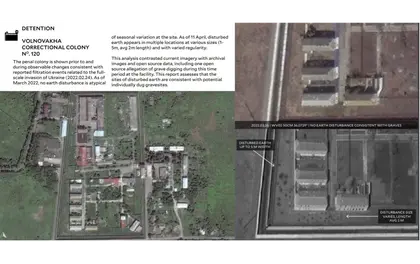Investigations into Russian filtration camps in the Donetsk Region have confirmed instances of torture and revealed mass graves.
On August 25, the Conflict Observatory, which has gathered, analyzed, and made widely available evidence of Russian war crimes and other atrocities in Ukraine, published a report on filtration camps in Donetsk region. The investigations were conducted by researchers at Yale University and supported by the US Department of State’s Bureau of Conflict and Stabilization Operations.
JOIN US ON TELEGRAM
Follow our coverage of the war on the @Kyivpost_official.
Russian filtration camps in Ukraine are a system of institutions of mass, forced detention created by the Armed Forces of the Russian Federation since the Russian invasion of Ukraine in February 2022.
The goal of filtration is to test Ukrainian citizens’ loyalty to the Russian regime and detain those Ukrainians who threaten Russian control over Ukraine, including anyone with pro-Ukrainian views.
According to the report, Russia and Russia-aligned forces operate a system of at least 21 facilities in and around Donetsk Region, using facilities that were previously schools, markets, and prisons. Signs of possible graves have also been observed around facilities.
According to satellite images presented in the report, mass graves were found near each filtration camp. The report contains many testimonies of torture, and inhumane conditions, including the detention of children.

EU Transfers €1.5 Bln Raised From Russian Assets for Ukraine
According to rough estimates, this large-scale filtration system has processed more than 1.5 million Ukrainians (including children). Most of them were forcibly taken to Russia.
Four Types of Filtration Facility
There appear to be four types of facilities involved in the filtration system: registration, holding, secondary interrogation, and detention.
At registration points – often schools or camp-like facilities where conditions are often poor – individuals are asked questions about their attitude to Ukraine and the Ukrainian Armed Forces. Personal information and biometrical data are also collected, after which individuals who “pass” filtration are provided with a certificate of filtration that allows them a degree of freedom of movement.
The interrogation centers are for people that do not pass filtration. They are held in inhumane conditions, and subjected to torture, for example, beatings and electric shocks. Sometimes interrogation centers and registration centers are in the same location.
Detention centers are prisons, mainly for men, that are designed for long-term detention about which the report gives strong evidence of inhumane conditions and physical and psychological torture.
Nathaniel Raymond, a human rights investigator, said that according to the results of the investigation, Russia and its proxies have created a “filter system” to sort people in areas under Russian occupation and that this presents a “human rights emergency.”
Reports of human rights violations have come from many locations, including the prison complex near Olenivka, where, on July 29, Russians allegedly killed 53 Ukrainian prisoners of war. In another example, a former prisoner said that the Russian occupiers were forcing prisoners of war to dig the graves of fellow prisoners.
You can also highlight the text and press Ctrl + Enter






